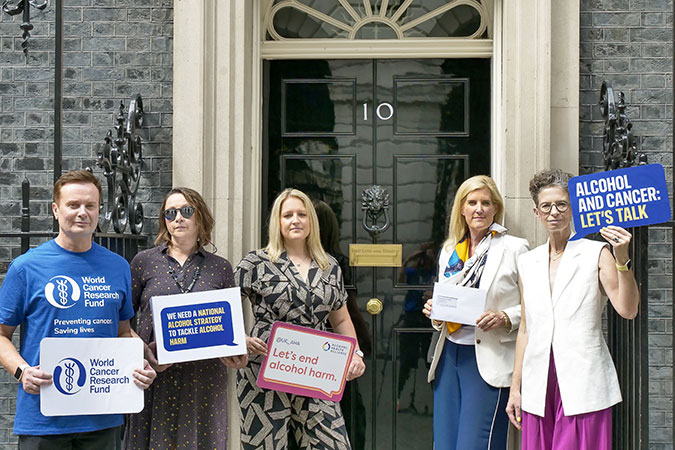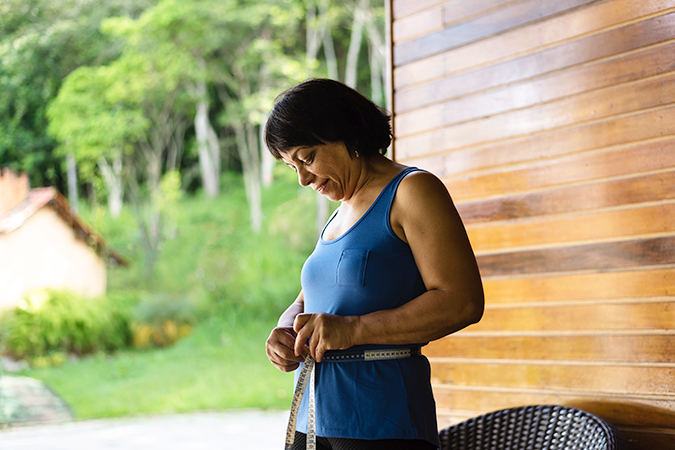We welcome these new evaluations by the International Agency for Research on Cancer and the World Health Organization on the health effects of the artificial sweetener, aspartame. The evidence reviewed led to the classification of aspartame as ‘possibly carcinogenic’, but also confirmed that the current recommended acceptable daily intake of aspartame will not change.
Our cancer prevention recommendation to limit consumption of sugar sweetened drinks, and to drink mostly water and unsweetened drinks, is consistent and remains appropriate in light of these evaluations. Following this, along with our other Recommendations, will give people the best chance of avoiding a preventable cancer.
We will continue to advocate for better research in these areas, in order to strengthen our understanding of how diet, nutrition, physical activity and body weight influence cancer risk.
We support the recommendations that future research should focus on well-conducted studies to better understand the relationship between aspartame and cancer risk and for more mechanistic studies to explore potential biological pathways.
Longitudinal body mass index and cancer risk: a cohort study of 2.6 million adults, published in Nature Communications, has found that overweight and obesity during early adulthood (between ages 18–40 years) could be linked with up to 18 cancers, with some of these cancers not previously associated to weight as a risk factor.
The results of the study found the longer the length of time, greater the degree, and younger the age of overweight and obesity, the higher the associated risk of developing 18 different cancers.
The large study of 2,645,885 individuals, looked at people’s body mass index (BMI) status across their lifetime instead of focusing on one BMI measurement. It was led by researchers from the Institut d’investigació en Atenció Primària de Salut Jordi Gol (IDIAPJGol) in collaboration with the International Agency for Research on Cancer (IARC) and funded by the Wereld Kanker Onderzoek Fonds (WKOF).
Previous evidence linked at least 13 cancers
Previous evidence from the World Cancer Research Fund and others have linked overweight and obesity to at least 13 different cancers. Some of the new cancers that the study has found could be linked to weight include leukemia, non-Hodgkin lymphoma and, among people who have never smoked, bladder cancers.
Andrea Pistillo, one of the study’s lead authors, said:
In this study we used advanced methodologies to retrieve missing information on BMI from participants. After nine years of follow-up, 225,396 participants were diagnosed with cancer.
We found that apart from BMI at baseline, other BMI-derived indicators such as duration, degree and age of onset of overweight and obesity were associated with the risk of up to 18 types of cancers. So far indeed, only 13 types of cancers were associated with high BMI. In fact, one of the objectives of the study was to assess whether life course adiposity-related exposures are more relevant cancer risk factors than only one BMI measurement.
Dr Heinz Freisling, based at IARC and one of the lead investigators of the study, said:
The results of our study support a re-evaluation of the cancer burden associated with overweight and obesity, which currently is likely underestimated.
Dr Talita Duarte-Sallés, the principal investigator of the project at IDIAPJGol, further emphasised the public health implications of the study findings:
These compelling results support the implementation of primary care-based strategies for cancer prevention, with a strong focus on preventing and reducing early overweight and obesity.
This pioneering research marks a significant milestone in understanding the intricate relationship between overweight/obesity and cancer risk. With these findings, the global community has a powerful new tool to shape targeted interventions, develop effective prevention strategies, and ultimately make a significant impact on cancer outcomes worldwide.
Dr Panagiota Mitrou, Director of Research, Policy and Innovation at World Cancer Research Fund, said:
This large study has future public health implications since additional cancers, such as leukemia and non-Hodgkin lymphoma, have been shown to be linked with overweight and obesity.
“Our own evidence shows that maintaining a healthy weight throughout life is one of the most important things people can do to reduce their cancer risk, and early prevention in adulthood is key.
Ends
About IDIAPJGol
The Institut d’investigació en Atenció Primària de Salut Jordi Gol (IDIAPJGol) is a leading research institute specializing in primary care research. Committed to advancing healthcare through rigorous scientific investigations, IDIAPJGol collaborates with various national and international partners to make substantial contributions to medical knowledge.

Get our policy enewsletter
Our monthly digest of the most important developments in international policy relating to cancer and nutrition and physical activity
World Cancer Research Fund International has released a new report: Building Momentum: Establishing robust policies to promote physical activity in primary healthcare. This is the 4th report in its Building Momentum series and the first to address physical activity policy.
Physical activity plays a vital role in promoting and maintaining good physical and mental health. It can help prevent and manage a number of non-communicable diseases (NCDs), including cancer. However, too many of us are not meeting the recommended physical activity levels.
World Health Organization (WHO) guidelines recommend that adults do at least 150–300 minutes a week of moderate-intensity physical activity or at least 75–150 minutes of vigorous-intensity physical activity, with muscle-strengthening activity on at least 2 days each week.
Evidence of reduced cancer risk
We have strong evidence that physical activity helps protect against endometrial, breast (postmenopausal) and colon cancers, as well as against weight gain, overweight and obesity. The latter is a cause of at least 13 cancers.
Primary healthcare professionals such as GPs and nurses are ideally placed to promote increased activity and support people to become more active, as they are often people’s first point of contact. To do this, robust policies on promoting physical activity in primary healthcare are needed within and between governments, local contexts and healthcare settings. The WHO clearly states that the promotion of physical activity in primary healthcare is an essential tool that can make a difference as part of a whole-systems approach.
The report provides policymakers, healthcare professionals and local partners with guidance on how to develop rigorous policies to promote physical activity in primary healthcare.
It draws strongly on the experience of developing and implementing physical activity promotion policies from experts in 9 countries and gives detailed snapshots of the situation in World Cancer Research Fund International’s network countries: the Netherlands, the US and the UK (England, Scotland and Wales). There are also further examples of policy initiatives globally.
Kendra Chow, Policy and Public Affairs Manager at World Cancer Research Fund International, said:
Being more active is crucial for good physical and mental health, and can help prevent cancer. Primary healthcare plays a key role in helping people be more active. Our report provides the guidance needed on designing policies to support them.
Governments have the opportunity to meet WHO agreed targets on increasing physical activity, to improve population health and reduce the burden of NCDs, including cancer.
Ends
For more information and media enquiries contact: pr@wcrf.org or d.mackie@wcrf.org (07717 131883)
About our Building Momentum series
Building Momentum reports take the latest research and lessons learned from governments who have implemented relevant policies to outline how to design and implement robust policies. The reports are designed to be tools to help policymakers overcome common barriers to implementing evidence-based policies.
About World Cancer Research Fund International
World Cancer Research Fund International is a not-for-profit organisation that leads and unifies a network of charities based in Europe and the Americas, along with representation in Asia, giving us a global voice to inform people about cancer prevention.
We are a leading authority on the links between diet, nutrition, physical activity and cancer, and we work collaboratively with organisations around the world to encourage governments to implement policies to prevent cancer and other NCDs.
www.wcrf.org and Twitter, Facebook, YouTube, Instagram & LinkedIn.
Preventing cancer. Saving lives
Download Building Momentum in our resource library
A series of reports to help policymakers overcome common barriers to implementing evidence-informed nutrition and physical activity policy.











